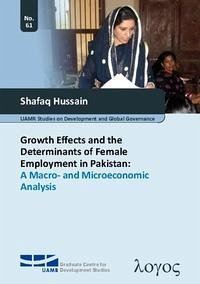This study analyses the eff ects of an increase in female labor force participation on the economic growth of a developing country such as Pakistan, as well as the factors hindering or promoting female employment in a religiosly conservati ve region. The Solow Model was used as a basis for this analysis and with a data set of 85 developing countries over a duration of 25 years, the positive and significant effects of an increase in female labor force participation on per capita income were obtained. A Case study of Dera Ismail Khan, Pakistan was conducted to explore the determinants of female employment. Consequently the decisive factors were the standard determinants of female labor supply while religious conservatism played no significant role in the area with respect to aiding or hindering female employment decisions. Shafaq Hussain is a development economist and a research fellow at the Institute of Development Research and Development Policy (IEE), Ruhr University, Bochum, Germany. Before joining the IEE in 2006, she worked as a lecturer at Gomal University, Dera Ismail Khan, Pakistan. Besides her experience as a teacher, she also worked in various projects as well as research surveys with Action Aid Pakistan and SAP-Pakistan. She is also a volunteer member of various local NGOs in the area.

